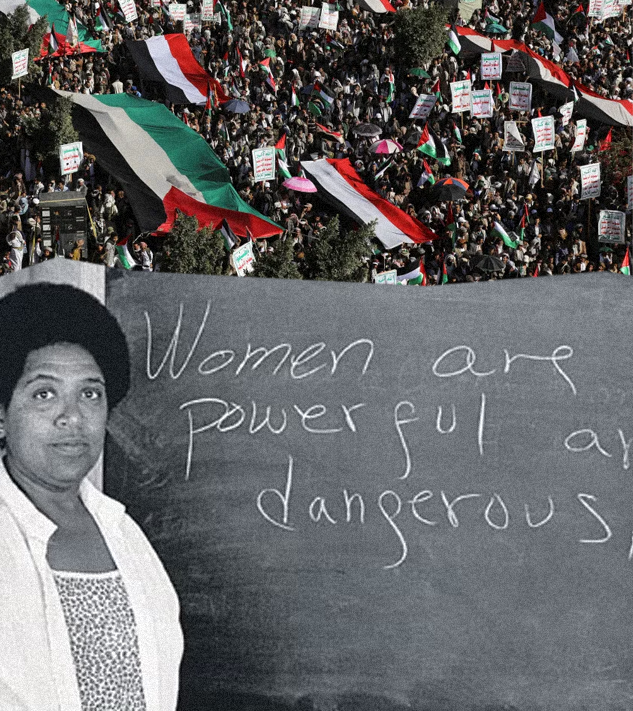Pro-Palestine Protests Through the Lens of Audre Lorde’s ‘The Uses of Anger’
Words: Kamana Rai
Make it stand out
Our inner worlds are portals to understanding our selves, our emotions and our creativity. “Anger is loaded with information and energy,” states Audre Lorde, self-described ‘Black lesbian, mother, warrior and poet’ at the National Women’s Studies Association (NSWA) annual conference in Storrs, Connecticut in 1981. The early failures of the NSWA were protested by women of colour due to its racism and failure to include people of colour in their conversations.
In the 1984 collection Sister Outsider: Essays and Speeches, Lorde informs us about the productive function of our anger - that our fury can be virtuous and female-defining; she posits deconstructing the patriarchal model of anger as simply “destructive”. Myisha Cherry, philosopher and professor who specialises in writing on emotions, calls this specific form of anger “Lordean rage”.
Cherry uses Lorde’s early feminist argument as inspiration in her new book, The Case for Rage: Why Anger Is Essential to Anti-Racist Struggle. She notes, “Unlike the rogue or narcissistic kinds, Lordean rage is not only concerned about how you can be a victim of injustice, it’s also concerned about how anyone could be a victim of injustice… it’s not self-centred.”
What are the uses of anger through a lens of Black feminist thought? Lorde articulates, “My response to racism is anger…it can become a powerful source of energy serving progress and change”.
When Lorde talks about the informative and energetic capacity of anger in her keynote speech Uses of Anger, we understand how rage is multi-faceted and explicitly not homogenous. Often anger is culturally misunderstood, with Black women being labelled as “overly aggressive” as a tool to diminish and silence. Lorde however highlights anger’s moral capacity — when addressing Black women and women of colour who have faced racism, she says outrage is an appropriate and inevitable reaction to injustice. It is a tool that detects discrimination.
My current anger is a response to the ongoing genocide of the Palestinian people by the Israeli state. My rage channels at the Zionist regime that continues to violate International Law with impunity. Our collective rage has led to six-months of Palestinian solidarity marches in the UK calling for a ceasefire in Gaza since October 7 last year and our ire is being heard. South Africa filed a genocide case against Isarel at the International Court of Justice (ICJ) and social media has fueled boycotts against multinational companies such as Starbucks who sued Starbuck Workers United (SWU) union for expressing Palestine solidarity, and McDonald’s for providing thousands of free meals to Israeli Defense Forces (IDF) soliders.
“For women of colour, the creative capacity of anger can be used for a greater good.”
Black Women Radicals, a black feminist advocacy organisation works in archiving the historical solidarity from black women of colour for the freedom of Palestine, including Lorde herself, who expressed support for the “recognition of the rights of the Palestinian people” in her speech at Oberlin College in 1989. Their records include a letter co-written and signed by Toni Morrison which called to resist Israel’s “liquidation of the Palestinian state” and work by Angela Davis who is known for her continuous advocacy for the Palestinian decades-long struggle for self-determination, calling Gaza “the world’s largest open-air prison in the world”. As the Zionist regime continues to commit war crimes, wiping out entire, multi-generational Palestinian families in Gaza, we must utilise our fury.
In the speech, Lorde says, “Anger expressed and translated into action in the service of our vision and our future is a liberating and strengthening act of clarification.” For women of colour, the creative capacity of anger can be used for a greater good. Once recognised and expressed as a response to injustice, it can be used to convey vital information that can be acted upon for social change. Utilising the voice of anger by speaking out against discrimination you witness in your personal and professional life, protesting out in the streets, signing petitions, voting, or utilising anger as a medium between art and activism, shows how the use of political anger can live up to its creative capacity and exist beyond its preconceived, patriarchal notions.
Lordean rage specifically births when a person experiences various types of anger upon experiencing or witnessing injustice. Israel’s attacks have led to the deaths of over 34,000 Palestinians since October 7 last year. Rage is the only correct response to the irrevocable loss and destruction of the Palestinian people, land and culture. Forms of systemic injustice are insidious and exist in the modern fabric of society and Lordean rage is necessary, an instinctual reaction, a tool of self-preservation in a world that overwhelmingly seeks to suppress marginalised communities. Lorde ultimately teaches us to harness the power of our emotions politically and morally.


